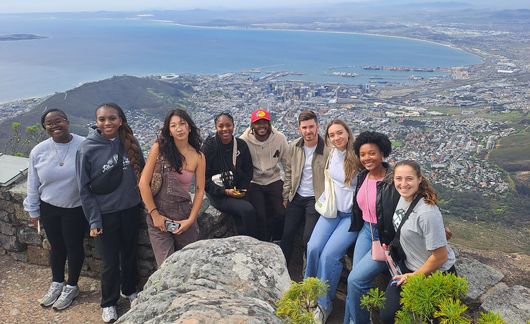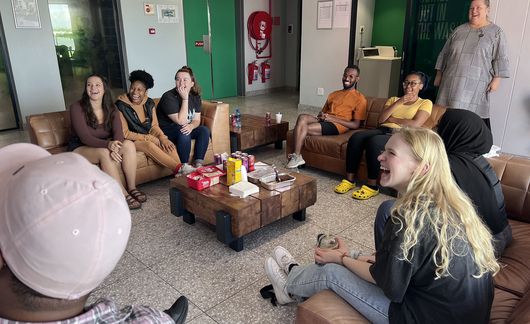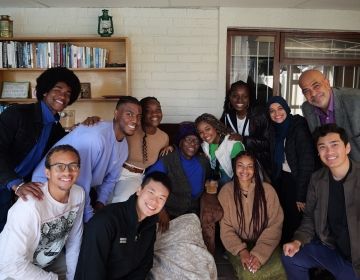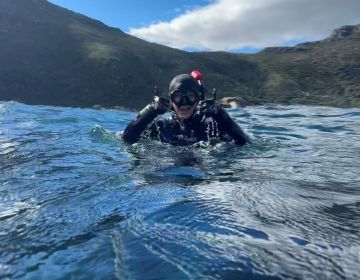
Engineering, Technology + Sciences
Unique Experiences
Visit Robben Island
a UNESCO World Heritage site where Nelson Mandela and other political leaders were imprisoned for fighting for democracy in South Africa
Hike Table Mountain
one of the New Seven Wonders of Nature
Explore the Cape Floral Region
a UNESCO World Heritage site and one of the most biodiverse in the entire world with fynbos vegetation being completely unique to the region
114
CURVES ON THE BREATHTAKING CHAPMAN’S PEAK DRIVE
10
10 BEACHES CERTIFIED AS BLUE FLAG IN 2016 FOR THEIR PERFECT STANDARDS OF CLEANLINESS, WATER QUALITY, FACILITIES, AND SAFETY
850 KM
IS HOW LONG CAPE TOWN’S ROUTE 62 IS – THE WORLD’S LONGEST WINE ROUTE
Your Destination
Cape Town, often hailed as one of the most beautiful cities in the world, captivates visitors with its stunning natural scenery, vibrant culture, and rich history. Nestled between the iconic Table Mountain and the azure Atlantic Ocean, Cape Town offers a unique blend of cosmopolitan flair and breathtaking landscapes. Its mild Mediterranean climate makes it a year-round destination, ideal for outdoor enthusiasts and urban explorers alike.
One of Cape Town's most famous landmarks is Table Mountain, providing sweeping views of the city and coastline. Taking a cable car or hiking to the summit is a must-do experience for visitors. Nearby, the Victoria & Alfred Waterfront buzzes with activity, offering a mix of shops, restaurants, and entertainment options set against the backdrop of a working harbor. Robben Island, a UNESCO World Heritage Site, is another poignant landmark, where Nelson Mandela was imprisoned for 18 years.
For those interested in history and culture, the Bo-Kaap neighborhood with its brightly colored houses and Cape Malay heritage provides a charming glimpse into the city's multicultural heritage. The Kirstenbosch National Botanical Garden is a paradise for nature lovers, showcasing indigenous flora against the slopes of Table Mountain. Cape Town also boasts world-class beaches like Clifton and Camps Bay, perfect for sun-seekers and surfers.
The Culture
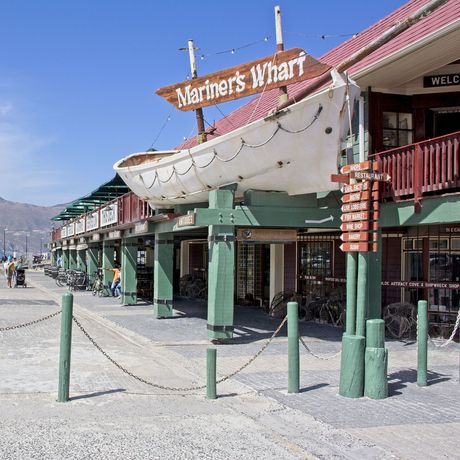
Excursions & Activities
Each CIEE program has frequent cultural excursions and study tours uniquely designed to complement the program’s academics and enhance cultural immersion.
Proposed day trips in Cape Town might include:
- Visiting an educational facility that uses effective methods to teach science, technology, mathematics, and engineering
- Visiting iThemba Labs, facilities committed to the development of scientific and technical competence in the field of accelerator-based science, with a special focus on women and designated communities
- Visiting the Desalination Plant at the V&A Waterfront; given the state of emergency of the water crisis in the region, the development was fast-tracked
- Visiting the South African Astronomical Observatory’s Southern African Large Telescope (SALT) in Sutherland, the largest astronomy site in the Southern Hemisphere
- Going on a Cape Peninsula Tour, inclusive of Hout Bay Harbor Market, Chapmans Peak, Cape of Good Hope, and Boulders Beach (penguins)
- Going on a day trip tour of Langa Community focusing on the history and sustainability of the community
- Surfing at Muizenberg beach to relax and enjoy one of Cape Town's coastal favorites
- Attending a Sunday lunch with a local family, where students get to sit down with a family in Gugulethu
- Participating in an African beading/African dance class, where students are either beading or learning about traditional African dance
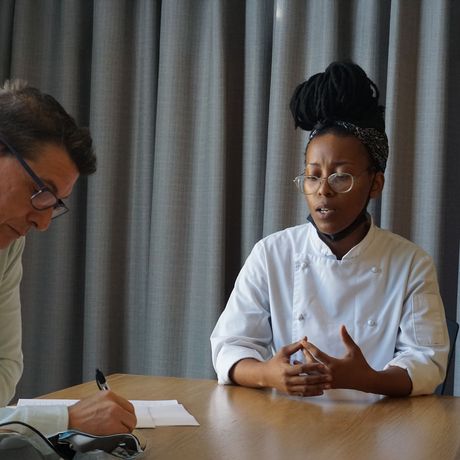
Professional Development
Directed Independent Research is for qualified students who have demonstrated academic rigor and curiosity toward a particular research topic. Independent research topics will be approved by CIEE Cape Town Academic staff and the home institution and must reflect a topic that is relevant to Cape Town. To be accepted into this course, students must submit a structured proposal with topic of exploration, significance of research topic as it relates to South Africa, methodology, a literature review, and a schedule of research milestones. Upon research completion, students will present their findings to a panel of academics.
Internships: Part-time internships allow students the opportunity to have practical work experience in a company within engineering, technology, or science sectors. In addition to the on-site business experience, students participating in an internship program have a weekly classroom component, which provides academic support to their practical experience. Additional materials are required to apply and qualify.
Examples include internships in:
- Greening and sustaining the environment
- Sound engineering
- AI tech projects as well as apps including early-stage startups
- Sustainable livelihoods and food security
- Eco village living
Program Blogs
Reflecting on South Africa as a Frederick Douglass Global Fellow
By: Sam Li Stepping off the plane in Cape Town felt like stepping into a whirlwind of vibrant energy, complex history, and breathtaking landscapes. This wasn't just any summer adventure... keep reading
South Africa Study Abroad: The Ultimate Guide
South Africa is simply astonishing. From its varied topography and rich culture to its complex history and diverse wildlife, a South Africa study abroad program promises the adventure of a... keep reading
The Cape Seal of Approval
Authored by Kai Edem (she/her) (Kai is a second-year undergraduate student at Agnes Scott College, majoring in Neuroscience. She is excited to discover more about research opportunities available during her... keep reading
Housing & Meals
Housing
CIEE Cape Town offers modern housing options to ensure you are comfortable in your home away from home. We tend to house our students in residence halls close to the CIEE Cape Town study center and to the Host institution. All housing is located in areas with good walking accessibility to several amenities including supermarkets, pharmacies, doctors and hospitals, banking services, and transportation.
- Standard Housing: Includes a shared room in a residence hall or shared apartment, which are located 10 to 15 minutes from the CIEE Cape Town study center/Host Institution.
Meals
Students are responsible for their meals, either preparing them at home or eating out in one of the many restaurants and cafés in the city.
Academics
This Engineering, Technology, and Sciences program in Cape Town program allows students to continue their studies while they explore contemporary South African society. Students participate in a variety of cultural activities and are strongly encouraged to participate in opportunities offered by University of Cape Town and CIEE.
University of Cape Town (UCT): UCT,established as South African College in 1829, is internationally recognized as the top-ranked African research university. In 2022, UCT ranked 160th in the world (QS rankings). The UCT campus has beautiful grounds and attractive facilities which include a range of commercial, medical, recreational, and sporting facilities. CIEE students will have access to AACSB courses offered by UCT's Faculty of Commerce.
Arizona State University: Enhance your international academic coursework with optional online courses that best align with your degree requirements and interests. ASU offers thousands of online courses in asynchronous 7.5-week sessions during the semester and 6-week sessions in the summer that fit within the CIEE academic calendar, so you can study abroad with CIEE while continuing to meet all your academic goals.
Course Information
Course Information/Notes
- University of Cape Town follows the South African Higher Education Qualifications Framework (HEQF) credit system:
- 1 HEQF credit typically equals .222 U.S. semester credits and represents approximately 10 notional hours
- Most courses are worth 12-30 HEQF credits
- Courses may be taken in all University of Cape Town Departments, except Health Sciences and the Graduate School of Business.
- Students applying for the Directed Independent Research Project or Internship are required to submit additional materials during the course selection process.
Academic Projects
Visual and Performing Arts
Agriculture
Social Sciences
Natural Resources, Conservation, and the Environment
Academic Projects
Biological and Physical Sciences
Social Sciences
Visual and Performing Arts
Agriculture
Business, Economics, Management, and Marketing
Engineering and Engineering Technologies
Natural Resources, Conservation, and the Environment
Below is a list of sample courses (subject to change) offered at University of Cape Town. For specific course listings, please refer to the UCT Handbook. Please note that not all courses within UCT faculties or departments are suitable for program participants, and many have prerequisites.
Engineering:
- Hydraulic Engineering
- Engineering Hydrology
- Geotechnical Engineering I & II
- Fluid Mechanics
- Structural Analysis I & II
- Mechanics of Materials
- Energy Conservation I
- Electromagnetic Engineering
- Introduction to Power Engineering
Science:
- Marine Ecology
- Principles of Ecology and Evolution
- Plant Diversity and Functional Biology
- Introduction to Astronomy
- Data Science for Industry
- Data Science for Astronomy
- Big Data Management and Analysis
- Game design
- Design thinking
Commerce:
- Geosystems: An Introduction to Earth and Environmental Sciences
- Environmental and Geographical Sciences: Climate systems
- Sustainability and the Environment
- Anthropocene and the Environment in perspective
- Archaeology
CIEE proudly partners with ASU to deliver asynchronous, 100% online coursework that aligns with your degree requirements from anywhere you study abroad.
CIEE and ASU offer courses online per program eligibility, at no additional charge. Be sure to review online courses with your home school advisor.
Check the CIEE Program Dates and ASU start dates below to maximize course options within your program!
Search ASU Online Courses BROWSE FAQs for more INFO
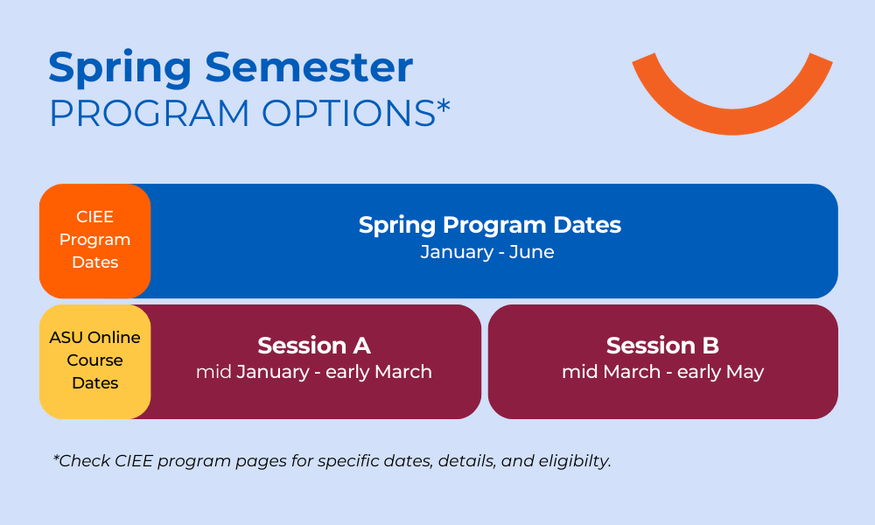
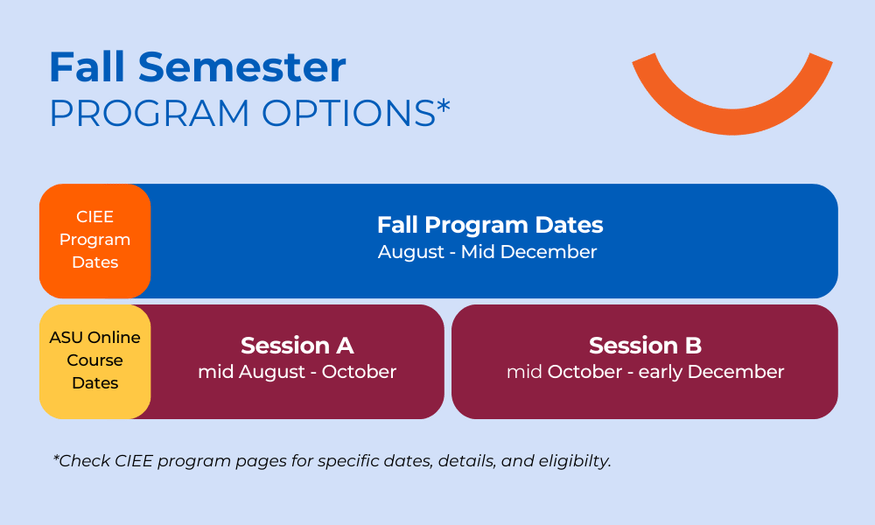
Note: This course listing is for informational purposes only and does not constitute a contract between CIEE and any applicant, student, institution, or other party. The courses, as described, may be subject to change as a result of ongoing curricular revisions, assignment of lecturers and teaching staff, and program development. Courses may be canceled due to insufficient enrollment.
"(GI)" denotes courses that originated at CIEE's Global Institutes and that are offered at multiple CIEE sites.
Discover Internship Opportunities
We're excited you're considering this program! Next, explore the types of internships you can choose from for an epic internship abroad with CIEE Study Abroad.
Explore Industry Options
The work culture in Cape Town is laid-back yet professional, emphasizing work-life balance, creativity, and innovation. Interns can expect to work with local NGOs, startups, or established businesses. There’s a strong sense of community, and colleagues often socialize after work in a friendly, multicultural environment.
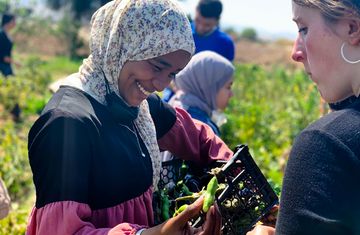
Agriculture, Food and Natural Resources
Gain experience in agricultural markets, agribusiness companies, and NGOs to study food production and global processes.
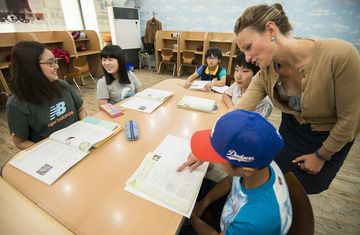
Education and Training
Experience international teaching methodologies and curriculum development in classrooms around Jordan, Spain, and more.

Health Science
Immerse yourself in global healthcare systems to study cross-border medical practices and address public health challenges.

Information Technology
Explore diverse tech environments, cutting-edge innovation, and emerging technologies in South Korea, Spain, and more.

Science, Technology, Engineering and Mathematics
Gain hands-on skills in sustainable technologies, research projects, and scientific studies in Costa Rica, Mexico, and more.
Browse Internship Opportunities
Explore internship placements available through this program to find the right fit for your academic and professional goals.
Disclaimer: Internship placements are subject to availability and host employer hiring discretion. Application and payment of CIEE fees does not guarantee specific placement. This internship listing is for informational purposes only and does not constitute a contract between CIEE and any applicant, student, institution, or other party.
Scholarships & Grants
CIEE offers scholarships and grants annually to help students like you make your study abroad dream a reality.
Students who apply to this program are eligible for the following scholarships and grants:
- Wollitzer Merit Scholarships in Area or Comparative Studies
- Ping Scholarships for Academic Excellence
- McDermott Health Sciences, Nursing, and Public Health Merit Scholarships
- CIEE Gilman Go Global Grant
- MSI Grant
- Trailblazer Grant
To be considered, submit the CIEE Scholarships & Grants application within your CIEE program application.
Dates & Fees
You get more for every dollar when you study abroad with CIEE, because our high-quality programs include everything from excursions to insurance. There are no hidden charges, and no disappointing surprises when you arrive.
Program |
Application Due |
Start Date |
End Date |
Fees & Housing |
|---|---|---|---|---|
| Program Fall 2025 18 weeks | Application Due Deadline Passed | Start Date | End Date | Fees & Housing $20,950 |
| Program Academic year 2025-2026 | Application Due Deadline Passed | Start Date * | End Date TBD* | |
| Program Spring 2026 18 weeks | Start Date * | End Date * |
*Dates for this program are provided as tentative dates. Please consult with your study abroad advisor to confirm dates before purchasing your flights.
To help you budget, keep in mind that students are responsible for the cost of international airfare, local transportation, books and supplies, visas, and personal expenses. In addition, your college or university may charge additional fees for study abroad, or may require you to receive a transcript via CIEE's School of Record, which carries an additional fee of $500.
Program Fees
CIEE offers the most student support of any provider in its program fee, including an airport greeting, full-time leadership and support, orientation, cultural activities, local excursions, pre-departure advising, and CIEE iNext travel protection with benefits.
| Participation Confirmation | $300 * |
| Educational Costs | $16,706 ** |
| Housing | $3,750 *** |
| Insurance | $194 |
| Visa Fees | $0 |
| Total Fees | $20,950 |
Financial Aid
CIEE offers the most grants and scholarships of any study abroad organization, including $8 million/year in travel grants, merit-based scholarships, institutional and MSI grants, and Gilman Go Global Grants.
Estimated Costs
Students are responsible and manage costs related to travel, meals, books, and personal expenses. Below are estimates for consideration.
| Meals not included in program fee | $1,328 † |
| International Airfare | $1,450 †† |
| Local Transportation | $500 |
| Books & Supplies | $100 |
| Visa Fees | $135 |
| Potential travel to consulate for visa | $500 ††† |
| Personal expenses | $235 †††† |
| Total Costs | $4,248 |
*non-refundable fee
**direct cost of education charged uniformly to all students
***Housing fees listed are for financial aid purposes only and should not be considered a basis for calculation of refunds.
†For groceries if you plan on making your own meals, budget more money if you plan on eating out regularly.
††round-trip based on U.S. East Coast departure
†††If no consulate in your home area
††††$100 emergency fund + cell phone expense + toiletries
Program Fees
CIEE offers the most student support of any provider in its program fee, including an airport greeting, full-time leadership and support, orientation, cultural activities, local excursions, pre-departure advising, and CIEE iNext travel protection with benefits.
Financial Aid
CIEE offers the most grants and scholarships of any study abroad organization, including $8 million/year in travel grants, merit-based scholarships, institutional and MSI grants, and Gilman Go Global Grants.
Estimated Costs
Students are responsible and manage costs related to travel, meals, books, and personal expenses. Below are estimates for consideration.
Program Fees
CIEE offers the most student support of any provider in its program fee, including an airport greeting, full-time leadership and support, orientation, cultural activities, local excursions, pre-departure advising, and CIEE iNext travel protection with benefits.
Financial Aid
CIEE offers the most grants and scholarships of any study abroad organization, including $8 million/year in travel grants, merit-based scholarships, institutional and MSI grants, and Gilman Go Global Grants.
Estimated Costs
Students are responsible and manage costs related to travel, meals, books, and personal expenses. Below are estimates for consideration.
What's Included
Tuition
Housing
Pre-departure Advising
Advising before you depart to set goals and answer questions
Optional on-site airport meet-and-greet
Orientation
Introduction to your program plus practical information about living in your host city
On-site Staff
Full-time program leadership and support in your city
Cultural and/or Co-curricular Activities
Excursions and/or Study Tours
Travel Protection
CIEE iNext travel protection
24/7 emergency on-site support
Our Staff
Nompilo Ndlovu
Center Director
Dr. Nompilo Ndlovu has over a decade of experience working within the academic, policy and non-profit sectors, focused on the African continent.
Thandeka Dladla
Student Life Manager
Thandeka holds a Bachelor of Music degree from the University of Cape Town (UCT). She worked as a mentor and teacher at the Butterfly Project, an education-based NGO focused on...
Jacana Redcliffe
Program Coordinator
Jacana Joi is one of the program coordinators at CIEE Cape Town. They are passionate about curating programs that facilitate student experiential learning opportunities. They are a Queer Linguistics student...
Get Started
1
2
Connect With Your Campus Study Abroad Office
Share your plans and confirm you're on track to meet all required steps to go abroad.
3
Contact CIEE
We're here to help! Send us an email if you still have questions or need information about applying to this program.
4
Interested in an optional internship?
After being accepted to this program and submitting the required internship documents, work with CIEE staff on your internship goals and select which positions to interview for. CIEE will reach out to companies that would be a good fit for you, your interests, and your qualifications. Finalize your internship placement upon arrival!
